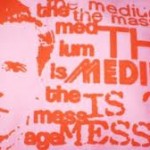“The Medium is the Massage” in 2011
 The year is 1967 and an academic named Marshall McLuhan writes a book. It’s a book called “The Medium is the Massage,” with only a few pages, pictures, white space and not very many words.
The year is 1967 and an academic named Marshall McLuhan writes a book. It’s a book called “The Medium is the Massage,” with only a few pages, pictures, white space and not very many words.
It would revolutionize how we think about media.
The title: “The Medium is the MASSAGE” was a printer’s error. It was supposed to be “The Medium is the MESSAGE.” He kept the erroneous title because he felt that it actually expressed what he as trying to say in a different way.
And what was he trying to say? Very simply that no matter what medium one uses to communicate, it becomes part of the message and helps to shape (or massage) it’s meaning.
McLuhan was not well understood in the 1960s. Most of his message was interpreted as commentary on how television was changing the way people thought. While this was true, it had much deeper significance. He uncovered the underlying principles that differentiate written, verbal, electronic and visual media.
Re-reading that book is eye-opening because he was, without knowing it, speaking to us today with great clarity. He was way ahead of his time and his messages resonate more clearly now than then.
A few quotes:
“Now all the world’s a sage.” Referring to the reach and speed of electronic communication, as well as the power of the crowd.
“The wheel is an extension of the foot. . . electric circuity, an extension of the central nervous system.” Replace “electric circuity” with “Internet.”
Media, by altering the environment, evoke in us unique ratios of sense perceptions. The extension of any one sense alters the way we think and act – the way we perceive the world. When these ratios change, men change.” Think about YouTube vs. a book, a Tweet vs. a paragraph.
“Time has ceased, “space” has vanished. We now live in a global village. . .a simultaneous happening.” Wow! many books and articles are in the midst of discussions about our interconnected worlds and what that means for culture, language, and even the viability of nations.
His ability to envison – imagine – define our interconnected, media-centric future was astonishing.
If you are interested in why YouTube, for example, has become so popular, or why Facebook has grown to connect 800 million people, you need to read this book.
McLuhan has inadvertently become the prophet of this age and we need his understanding of the power that the Internet has to change and shape our thinking and behaviors.
I sugest you run our NOW and get a copy. It is very short, but deeply powerful. It’s available here.





